Fairygodboss Radio: Alisha Kalb - Systems Engineering Leader at GE Aerospace
"It's important to be authentic, to bring your whole self to work, and not be ashamed of it."
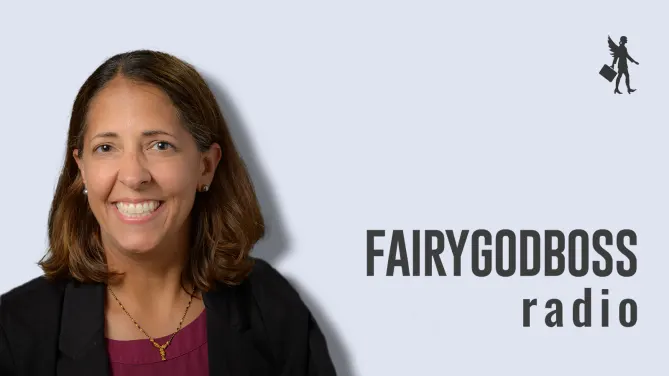
Alisha Kalb. Photo courtesy of GE Aerospace
About the Episode
In this episode of Fairygodboss Radio we chat with Alisha Kalb, the Systems Engineering Leader at GE Aerospace. Alisha began her career at GE Aerospace immediately after college when she was drawn to the company after hearing about their fantastic training program.
Throughout the episode, Alisha shares the many roles she has taken on during her 20 year journey, her passion for mentoring, and her unique perspective as a leader in engineering. Alisha also emphasizes the importance of authenticity and asking for help during challenging times.
Listen to the full conversation below. We also provide a transcript of this exciting discussion in the following article.
Fairygodboss is proud to partner with GE Aerospace. Find a job there today!
[Recorded May 2024]
About the Guest
Alisha has been working at GE Aerospace for 20 years, focused on design and systems engineering of in-service products. Alisha joined when GE Aerospace was GE Aviation in 2003 as a member of the Edison Engineering Development Program. After that program, Alisha held roles of increasing responsibility in turbine airfoils design engineering. In 2013, Alisha was promoted to Executive Technical Capability Development leader. In this role, she was responsible for GE’s Global Technical Education organization and the Edison Engineering Development Program, ensuring continued growth and evolution of the program for our early career engineering talent. In 2016, Alisha took the role of Life Cycle Engineering leader for the Regional Engines and Services business, where she was responsible for the design, fleet support, and repair of GE’s regional engine products. In 2019, Alisha transitioned to Systems Engineering, leading the Systems team for the LEAP-1A and LEAP-1C products. In 2022, Alisha accepted her current role of Systems Engineering Leader for the GE9X engine.
Alisha is passionate about inclusion and diversity and was the leader of GE's Asian Pacific American Forum from 2019-2023. She has a Bachelor’s degree in Aerospace Engineering from the University of Michigan and a Master’s degree in Mechanical Engineering from Ohio State University.Episode Transcript
Gabi Carachilo: Hello everyone, and welcome to Fairygodboss Radio. I am so excited to be joined by Alisha Kalb, Systems Engineering Leader at GE Aerospace. Alisha, welcome to the show.
Alisha Kalb: Thank you, Gabi. Thank you so much for having me today.
Gabi Carachilo: We're thrilled to have you and I'm so excited to jump into conversations. I'd love to get started by learning more about your career journey. How did you get to where you are today?
Alisha Kalb: Great. So I started at GE Aerospace immediately after college, and I joined really because of the fantastic training program. That was really what got me excited about GE and brought me to the company. Through the training program, I was able to take rotations in different areas and really fell in love with mechanical design engineering. So I came off program in a mechanical design engineering role and really used the first several years of my career to build my technical depth and technical expertise in a specific design area. From there, I took roles as a subsection manager, so a frontline leader for design engineers and was able to grow at being a leader and learning how the organization clicked. After a few years of leading a design engineering team, I stepped out of my pure technical roles and was really able to take much more of a strategic role leading our entry level engineering programs and our technical education programs.
So this was an unbelievable experience. I not only learned what it took to hire folks, how to onboard them, how to learn what the young career engineers were looking for, but I also was able to lead strategic initiatives, which isn't something that I had a chance to do before that. From that role, I transitioned back into a larger design engineering leadership role and was able, at this point, to lead entire engine programs from a design engineering standpoint. And from there I moved into the role I'm in now and the types of roles I'm in now in systems engineering. And in the systems engineering function, we're really responsible for that overall integration of the entire engine program, and we're able to work really closely with our customers, our airframers such as Boeing and Airbus and Comac, as well as the regulators such as FAA and yasa. So it's a really exciting role and it's really been a journey through, several different technical roles, increasing responsibility to get to where I am today.
Gabi Carachilo: That's incredible. And I was trying to tally up the years as you're walking through your, your career with GE Aerospace, and—
Alisha Kalb: Just about 21 years.
Gabi Carachilo: 21 years, that's incredible. You don't see that all too often, and it's a testament of course to your contributions and the value that you've brought to the organization throughout your tenure, but also a testament for GE Aerospace and the investment that they make in their workforce. I would love to learn more about how GE Aerospace has supported you throughout those 21 years. Could you elaborate on that?
Alisha Kalb: Yeah, absolutely. I feel reflecting on this and reflecting on my career here, that GE Aerospace has really supported me every step of the way in many different ways. First off, I've had fantastic mentors throughout my entire career that have helped me in both large and small decisions, things such as, you know, what am I gonna do for my next role? As well as how do I navigate through getting a promotion and having children and getting married, and all of those things going on throughout my life. I've also had sponsors, right? A lot of sponsors that are really helping me behind the scenes in the rooms that I'm not in advocating for me and advocating for the work that I've done. So I find that, you know, for folks that aren't familiar, sponsorship is different than mentorship. The mentor is gonna give you that advice and really talk about their experiences and the sponsor's the one who's gonna help advocate for you when you're not there, right? Make sure that the folks in the promotion discussions understand what you're doing. But in addition to that explicit mentorship and sponsorship, I really feel like I've had the flexibility to navigate through both my personal life and my work life at the same time. I had my second child as I was in my first executive role, and that turned out to be a real challenge for me. And what I was able to do was ask for a part-time schedule during that time, and I was granted and offered the ability to go down to four days a week, and it was really what I needed, right? I just needed that relief out. To like take a breather, have a little bit of time to myself and have a little more time to take and spend with my family. So again, GE Aerospace has really helped me, mentorship, sponsorship, but as well as that flexibility to navigate through this entire, this entire journey.
Gabi Carachilo: Thank you for sharing that with us. I love hearing the vast amount of support that GE Aerospace has provided in so many different ways. We'll talk a lot about mentorship and sponsorship later on in our conversation, I'm sure, but flexibility is so important and it's so important to the women in our community as well. So I am grateful that you felt comfortable sharing with us and also highlighted that program or that opportunity that you were provided. It sounds like you've had a lot of pivotal moments throughout your career and in your life. What are some of the most important turning points that you've experienced and some of those important decisions that you made along the way?
Alisha Kalb: Sure. So I really think back to my childhood and I think back in a lot of ways to some of the experience that I had as a child that really brought me to where I am today. And a lot of it really was around the very typical math and science and encouraging the math and science career. I had some great math teachers in the seventh, eighth grade timeframe, as well as I had some opportunities to go to some science and engineering camps where folks really inspired me. And then of course, above all of that were my parents. My parents were big into the math and science career, and I did find that throughout my time, you know, I ebbed and flowed on confidence and my confidence and the ability to want to do this and want to persevere. My mom in particular was quite encouraging and was always there to push me forward.
I think in addition to that, you know, some of the other pivotal experiences that I had, it was a challenge for me to move to GE to move. I moved to a new city that I had never been to that I didn't know anybody in, and really was able to pick up and start a new life. In retrospect, it was maybe quite scary, but at the time I remember being excited. I remember just looking forward to it and saying, okay, I'm ready to, ready to start something new. Let's go. As far as my, you know, pivotal moments at GE and at GE Aerospace. It's really been around kind of leaning into the next opportunity. I don't think there's one pivotal moment, but I've always been excited about the opportunity, excited about the next challenge, and GE has always been there to offer me that next challenge. We have a phenomenal product and we've got a lot of great engineering work and there's no shortage of challenges. So I've been really lucky to have those continuous opportunities to grow and to grow into challenges year after year.
Gabi Carachilo: Well, first, it's amazing that you were introduced to STEM and really found that passion early in your education journey. I'm also hearing the support that your parents and especially your mother brought forward, which is remarkable. And then that continued support from your employer and those opportunities to continue to grow and lean in, which is, which is just amazing and, and we need more of that, right? We want to encourage more women in the STEM fields and it's important work that that we're doing. Can you tell us a little bit more about what your experience has been as a woman engineering leader, and with that, what advice do you have for other women who want to enter the STEM field, who want to become engineers and maybe even do so at GE Aerospace?
Alisha Kalb: Overall, my experience has been really positive as a female engineering leader. I think many, many folks will say, and many women will say, there has certainly been times where, you know, I've been the only woman in the room and there's been times where you felt isolated. You felt like you maybe didn't have that connection point. My advice in those moments is really to reach out to your network. It is sometimes incumbent on the individual to find that network. We have great employee resource groups at GE Aerospace, strong Women's Network, Women in Technology. I'm also a big part of our Asian Pacific Allies and Friends Group. And so using those networks to really build that comradery and build that friendship has really been a huge part of me feeling supported in those times and those moments that may have otherwise been a little isolating or a little lonely.
The other thing though, that I've found on the flip side of being a, a female engineering leader is I found that I can really offer unique perspectives in a lot of ways. The way that my brain works and the way that I'm wired is often different than many of the other folks in the room. I have much more of a bias for collaboration, for relationship building, for solving a problem with a large group of people, and kind of coming up with that win-win outcome. And I really feel like that's served me. And over time my team has really grown to appreciate that ability to bring things together. And so really, I think recognizing that that's a strength, right? And that's something unique that I can bring to the team. I think as a female engineering leader has been something that I have learned to value and grown confidence in over time.
So my advice to females that want to become engineers or engineering leaders is really just to, to stick with it and to enjoy it. It's, it's been a lot of fun, to be honest. Like there's challenges every day. There's challenges every month, every year. I've heard women oftentimes come to me early career women and say, you know, maybe I don't wanna go into engineering because it's all that time behind a computer. I don't wanna stare at a computer and do a model all day. And certainly that can be part of an engineering role, but there's a lot of relationships and there's a lot of communication and storytelling that you can use to offset that technical side of things. So it's a pretty well-rounded job. It's a lot of fun and it's a lot of challenge.
Gabi Carachilo: It does sound like a lot of fun, and the work environment and the culture sound incredible as you talk about the employee resource groups, the community, the friendships, the comradery. Sign me up that sounds amazing.
Alisha Kalb: We are hiring at GE Aerospace, <laugh>, we’d love to have you.
Gabi Carachilo: I love it. And we've touched on this theme of community, of sponsorship, of mentorship, and it sounds like you've certainly played a role as a mentor for other women within your community, within the ERGs, within GE Aerospace. How do you go about that? Certainly the employee resource group component is part of that. Are there other facets where you're able to share your expertise and your mentorship throughout the organization?
Alisha Kalb: I feel super passionate about mentoring because as you mentioned, I've had so many people that have helped me in different capacities. So I feel like at this point in my career, it's a perfect time for me to start giving back. What I find is certainly there's formal mentoring programs and I always sign up for the formal mentoring program as a mentor. So I have mentees through those programs, both one-on-one, and we also do some small group mentoring. But what I've really found is that by myself being authentic and really being myself in my day in day out journey, it helps attract people to want to come talk to me. We oftentimes think that the other person or the leader or the person with the biggest title in the room, they've got it all together, right? They know what they're doing. Well, I like to often tell people that I do not have it all together and I have just as many challenges and struggles as anyone else. And I find that talking this way day in and day out with my team, really helps encourage people to come talk to me. So I'll often share a personal story, share vulnerabilities, share what happened with my kids or my husband, and then if they ask a question, I'll just be like, set up 30 minutes on my calendar. I'm always here. We'll find time to make it work and have the conversation. And sometimes it becomes a one-time conversation and sometimes it becomes a recurring conversation.
Gabi Carachilo: I love that. I love that authenticity that you bring and there's a movement I've noticed, especially in recent years, where employers are encouraging people to show up as their full authentic selves in the workplace. And we're seeing that shine through in the actions of leaders within organizations who are walking the walk and talking the talk. So I thank you for bringing that to this conversation and I'm sure everybody that you've interacted with at GE Aerospace appreciates that as well. I want to pivot to talk about lessons learned, right? In your 21 years at GE Aerospace, is there an impactful lesson that you've learned you'd like to share with our audience?
Alisha Kalb: I think the most impactful lesson that I have learned is that you're not in this alone and you shouldn't be afraid of asking for help throughout your career. I think we all take it upon ourselves to try to do it all, to try to hide our challenges, to hide our struggles. And really what I have found is that the more you talk about them and the more that you're open about them, the more people are willing to help. I talked about the part-time experience I had early in my career, but since then, you know, I've had challenges with family members. My dad went through a battle with cancer for a year and I was pretty open about that with my team. I was in one of the most challenging roles I've ever been in in my career, and I was amazed by the number of people that stepped in to help. Stepped in to help me personally, stepped in, to help me professionally. And then when I did need to be out for extended periods of time to be with my dad, everybody jumped in to help and to just make it seamless for me so I didn't have to worry about a thing at work. Well, I noticed for myself, when things start to pile up from a personal standpoint outside of work, I feel this tightness, I feel this tenseness of all the things that I need to do, but when I just talk about it, ask for help, everybody jumps in and immediately that tenseness just kind of goes away and I'm able to feel better. And then that's what helps me break free and be able to manage those different things that is going on. They're usually for shorter periods of time. It's not for, it's not for years at a time that I'm going through this. And so I'm able to ask for that help to kind of integrate things a lot better and it helps me get through that time to the next time where I am able to maybe give more at work when I don't have some of those challenges going on and I can give back to work and maybe give back to others.
Gabi Carachilo: It's important advice and great feedback. I appreciate you sharing that with us. And it is important to also note that everybody is experiencing challenges in some shape or fashion. It could be personal, it could be professional. And if we all have that trust and level of comfort to share with our colleagues and raise our hand to say, I need a little help, it could make a huge difference for that individual and the collective team - while still being able to make strides towards those organizational goals. So it's so relevant and I appreciate you sharing that with us. As we talk about challenges, I also wanna call attention to the fact that the past few years, right in, in this workforce, in this economy, you name it, it’s been challenging in many ways. Are you doing anything differently as a result? And do you have any advice for our audience on how to persevere? I think asking for help certainly is relevant to the discussion. Anything else that you would note in reference to navigating this wide variety of challenges we're all experiencing?
Alisha Kalb: Absolutely. And you know, I think we all learned a ton during the pandemic and some of that I think we can apply as we're in this post pandemic world. I went from a role where I was traveling maybe two weeks out of a month to immediately all of that stopping of course during the 2020 timeframe. And in some ways, of course, you know, it is always great to get back to face to face, but it really allowed me to reflect on which of this travel is necessary and where do I need to be. And how can I prioritize my time a little bit better? So that's one thing I have been really trying to do, which is to make sure I understand where I need to be and when, you know, I want to be a little more in control of my calendar and of the choices that I make. And so if I'm absolutely needed to be there, I'm not opposed to travel, I make the arrangements and I make it work. But there has been definitely times where I have said, you know, okay, I think I can call into this session. Or on the flip side, my children need me at home and you know, I really need to prioritize being at home right now, so I am going to call into this session and we're gonna be able to make that work. So that's one example. You know, the other thing I've really been trying to do is to focus on being one place at a time and doing one thing well. I found that really pre pandemic, I was always trying to do a hundred things at the same time. So every time I was driving somewhere, I was on a work call and I'm trying to watch a map and talk to a kid and you know, do 10 things at the same time. I've really been trying to be in one place at a time and do it well. So if I'm on a call in the car and I'm driving my kids somewhere, I usually send a chat and say, I need to hop off for 20 minutes. I need to focus on my family right now. I'll be back on as soon as I'm done. And every single time the people that I'm on the call with have said, okay, great, talk to you soon. And my kids really appreciate it because I'm finding that, you know, as they're growing up, we don't have those moments very much anymore. And sometimes in the car you get some of your best conversations <laugh>. And so I don't wanna miss those by trying to do two things at a time. So I think those are some of the things I'm really trying to do to get the most value out of each of those moments. Right? And it, it really does help me recharge knowing that I am being present in the moment and frankly doing five things at a time is really exhausting.
Gabi Carachilo: That feedback really resonates with me and I'm sure many others in our community. I'm a working mom of two and I struggle with trying to really focus in on one thing at one time and find that balance and prioritize accordingly. And we hear that too from our audience who tell us, you know, they're struggling with how to balance those responsibilities of work and personal life, especially now, especially after the pandemic era, as you noted. You shared some strategies of how you found a balance that works for you. Any other tactics, any other recommendations for others who are listening in and dealing with some of these same challenges?
Alisha Kalb: Absolutely, and I've heard more and more people say this lately, but I'm gonna repeat it. I don't subscribe to the idea of balance, right? I always think that balance infers or implies some sort of destination, that it's a point that you get to and you've reached it. And I have this like yogi on the top of a mountain doing a zen pose. When I hear it, it doesn't exist. So I think like I've kind of gotten comfortable with the fact that there's no destination. It's this day in day out decision making that you're making with yourself, your partner, your children, your boss, like that whole thing kind of needs to work together. And different days it's gonna be tipping one way versus the other way. For me, you know, the biggest tactic that I have is the Google calendar. That is like a kind of a very small thing, but whatever that organization method is for your house, I just say commit to it and go all in.
My husband and I have agreed to the, every single thing goes on the Google calendar and that my in-laws have access to it, the babysitters have access to it. It is literally in work terms, it is a single source of truth and it is where everything goes. It also kind of takes the pressure off of like remembering to tell everybody everything. It's on the calendar. We kind of talk about it about a week out once it's on there and we make sure we don't have conflicts, but it really, really helps us. And then my only other thing to add, I think I've echoed this a few times, is asking for help in your personal community, right? It takes a bit of a village to raise children sometimes. And so we are in multiple car pools with the neighbors, with the friends, getting everybody everywhere they need to go and you know, we help others, others help us. So it's kind of this ongoing like give and take for help applies at work, it applies at home and just don't feel too proud. Like you have to do it all yourself. It took me a long time to realize that. I think I kind of went through a lot of times saying I can do this, I can do this all myself. And before I realized what am I, why am I doing this? People want to help me. I want to help people. Like it really all works better. Once you kind of like get your head around that.
Gabi Carachilo: Share that invite out to the Google Calendar folks.
Alisha Kalb: Yes.
Gabi Carachilo: Everybody weigh in. Everybody have access. That's brilliant. That's brilliant because I certainly live off of calendars, especially for my normal workday. Let's bring everybody into the mix and have that single source of truth. I love that. Alright, we're going to transition to a fun section of our conversation, which is our fast five questions. Are you ready to jump in?
Alisha Kalb: I'm ready.
Gabi Carachilo: Awesome. My first question is, what is your favorite karaoke song?
Alisha Kalb: Don't Stop Believing by Journey.
Gabi Carachilo: I love that - classic. What is your favorite way to practice self-care?
Alisha Kalb: So I don't know if this counts as self-care, but I love just hanging out on my deck in my sweatpants with my husband, with my neighbors. No plans, last minute and just having some good conversation. That is my recharge mostly on Friday nights I like live for those moments.
Gabi Carachilo: Oh gosh, yeah. Get some snacks into the mix, I'm sold. I'm there. Totally Self-Care. Who is one celebrity that you would like to have dinner with?
Alisha Kalb: I think I'm gonna go for Michelle Obama on that one. I would love to spend some time with her.
Gabi Carachilo: Ditto. What book would you recommend to our audience?
Alisha Kalb: So I mostly read for fun, I'm not gonna lie. And so I feel like you maybe want me to share a professional development book on this one, but I'm just gonna say, read whatever makes you happy. For me, it's a way to escape, it's a way to recharge. It's a little bit of self-care, so I don't wanna recommend one book, give anybody anything more to do. I'd say read whatever is fun for you. I'm pretty into Colleen Hoover right now. I find that to be a good escape from reality.
Gabi Carachilo: That is fair. That is fair. And my final fast five question is, at Fairygodboss, we believe that women are disadvantaged because we're not taking credit for our accomplishments and we believe that we can only get better if we practice. So my question is, can you brag for us right now and share an accomplishment, personal or professional?
Alisha Kalb: And I love the sentiment because it is hard to brag. And so I'm gonna share that. I did lead our Asian Pacific Allies and Friends group for eight years. We did some really big events, we had a lot of funding, and then the company went through some challenges and we had to downsize a lot. And then I was able to get a lot more energy around it, do some rebranding, get new leaders involved. And really, I left it a lot better than when I took it over and was able to successfully transition out of the role last year. So it was a big accomplishment for me. A lot of time spent, not something I get to talk about very often, but something that I'm really proud of.
Gabi Carachilo: Wow. I would be proud too. Thank you for sharing that with us. That's amazing. My final question is, what is the number one piece of advice that you want to leave our audience with today?
Alisha Kalb: I would love to share with everybody how important it's, I think to be authentic, to be you, to bring your whole self to work and to not be ashamed of it. I've spent, you know, much of my career really building my confidence in being myself and what my style is at work, and feeling like that was gonna be the right style to lead. And I just hope that others can feel comfortable being themselves, bringing themselves to work and leading as they are.
Gabi Carachilo: That’s great advice. Well, thank you so much, Alisha, for joining us today. I enjoyed our conversation thoroughly and really appreciate your time. For those who are listening in and also enjoyed the conversation, we're just as impressed with Alisha and GE Aerospace and would like to learn more, please visit GE Aerospace profile on fairygodboss.com. Thank you so much again, Alisha.© 2026 FGB Muse Group Inc.

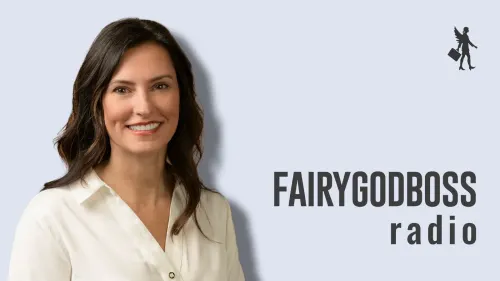
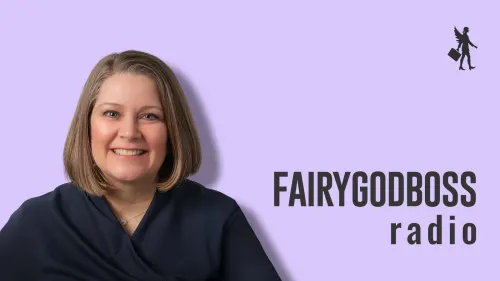
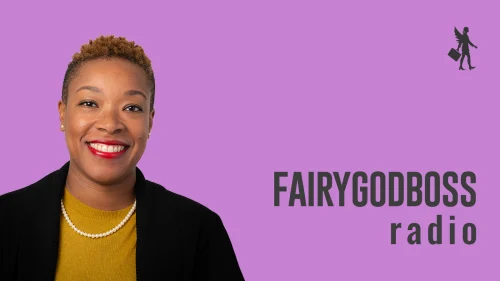
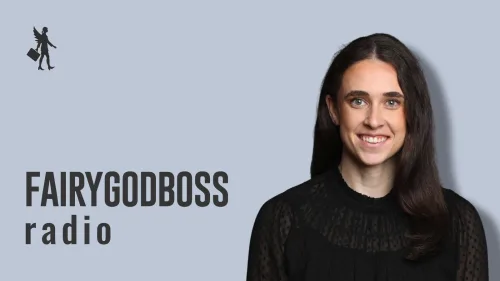
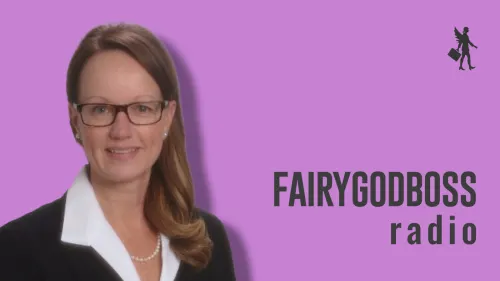
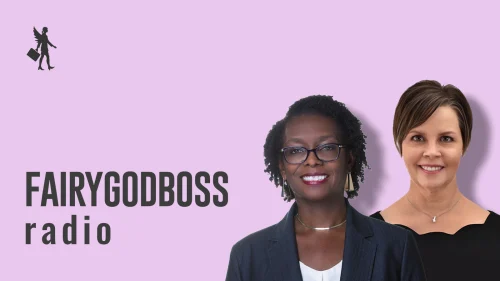
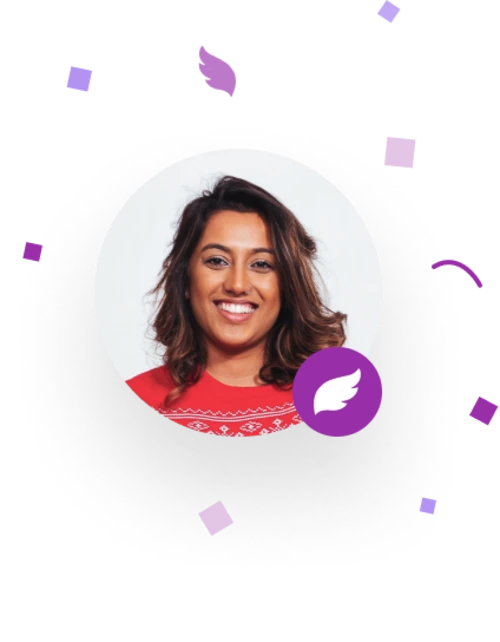
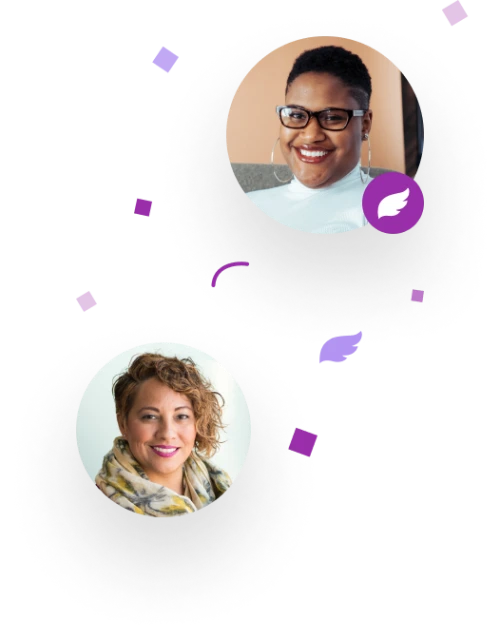
Share your insight
Join an authentic community that helps women support each other at work. Share your professional experience or ask for advice — you can even post anonymously.